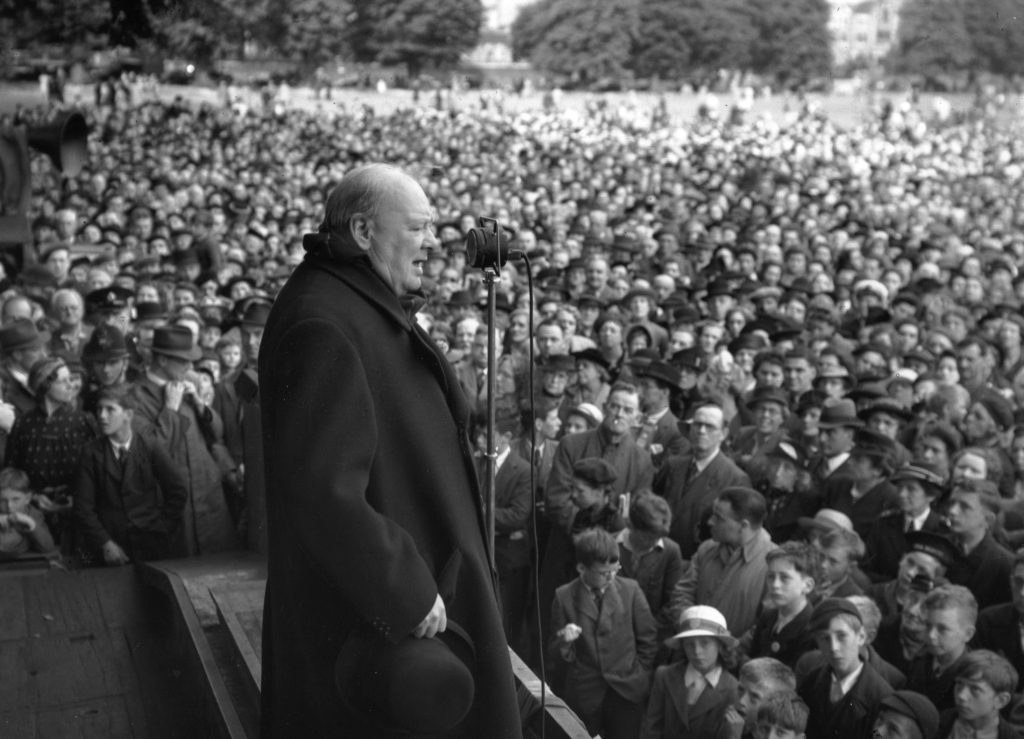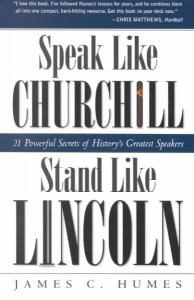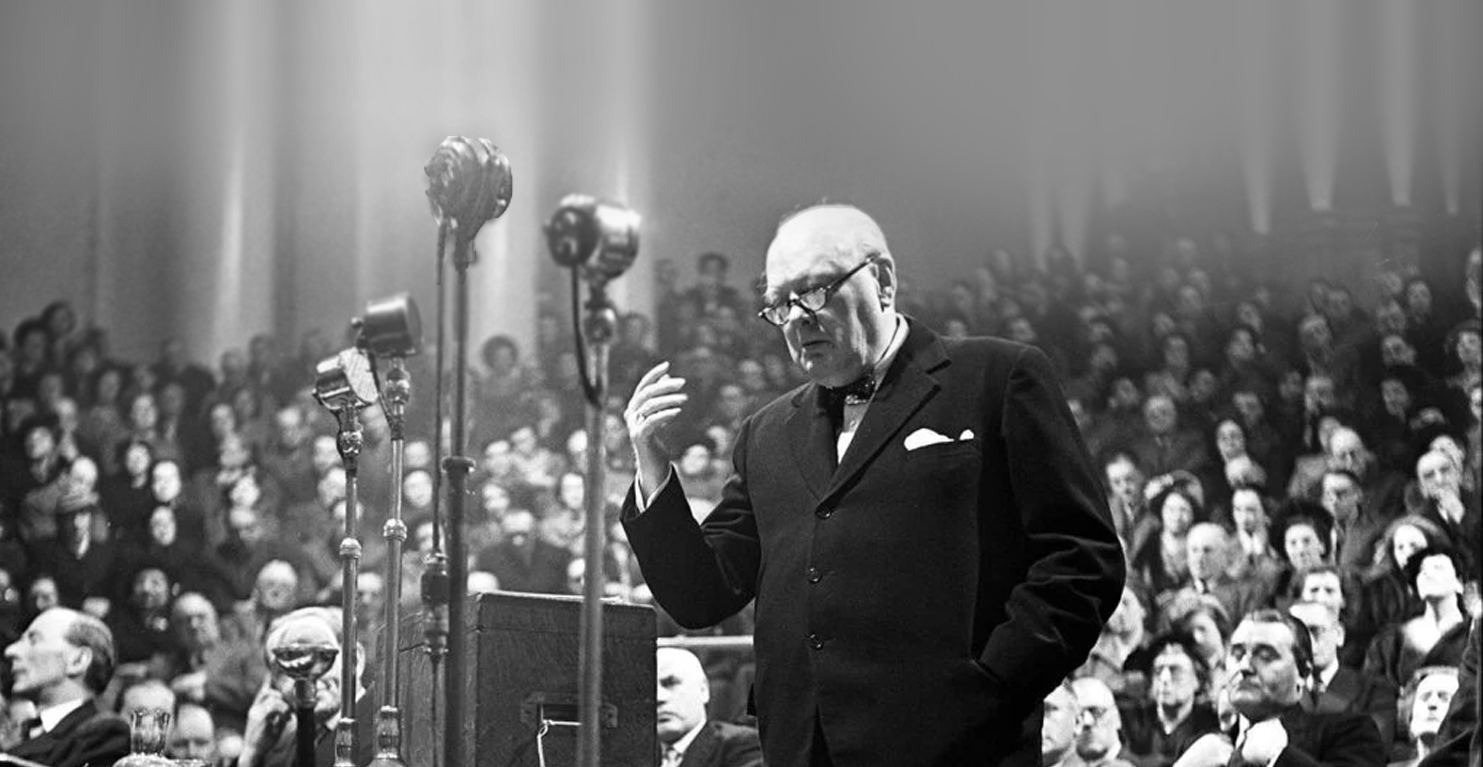Today we are going to talk about some of the things we can learn from history’s greatest speakers.
I regularly get asked the question How to become a Powerful Speaker? by guides and tour leaders in the Be a Better Guide Community. Therefore, in this video, we’ve turned to some of our greatest historical orators and a book by James C. Humes for some advice.

To help inspire you even further, I’ve put together a free resource: “10 Incredible Speeches, by 10 Incredible Speakers” It is a hand-picked group of 10 youtube videos you can watch online for free!
Instead of choosing exclusively political speeches, I’ve included some of the most powerful speeches I’ve seen in the last 5 years. Take a look, enjoy the videos, but most all, watch how the speakers use the techniques we’ve mentioned.

A big part of the inspiration for this video came from a wonderful book called, ‘Speak Like Churchill – Stand Like Lincoln’ by the author James C. Humes.
I really enjoyed the read and thought there were some extremely important techniques shared about how to captivate and inspire an audience. You can learn more about the book or order it online using this link right here.
Humes offers over 21 techniques used by some of the greatest speakers of all time. But, just to give you a little taste, in the above video, I offer 5 of the tips that I think are incredibly relevant for tour leaders.
Guides are regularly in front of audiences and are expected to entertain, educate and inspire their guests. We have such an opportunity to take our public speaking to the next level, simply by carefully observing other talented orators.
Good luck and enjoy!
Kelsey T
Finished Watching?
In the comments below, share a video link to one of your favourite speakers. What makes their speech stand out to you? I’m REALLY excited to see video clips of some of your favourite speeches and thanks for sharing with the whole community!
Transcript:
Hi, Kelsey Tonner here from beabetterguide.com. I recently came across a book, Speak like Churchill, stand like Lincoln, by James C. Humes.
Now in this book he offers 21 techniques that he argues are used by some of the most powerful speakers in whole of history. Just to give you a little taste I wanted to give you five tips that I feel are the most relevant for tour leaders.
One the power opener. Almost all great historical speeches start right out of the gates with a very powerful beginning. I find most tour guides will often spend the first few moments of their speech with some inconsequential banter or maybe some housekeeping items or things like these.
Instead we should start with a strong message. This is the time to capture everyone’s attention, and to inspire confidence in your leadership. “Are you about to embark on a journey, or maybe you are about to create a memory of a lifetime?”
Use these opening lines to build excitement. Now FDR after the attacks of Pearl Harbor could have addressed the nation, the United States many ways. He chose these beginning lines which are now some of the most iconic in all of the 20th century.
“December 7th 1941, a date which will leave in in for me.” Take a moment to reflect on how you begin your tours and how you can make your opening lines more effective.
Two, the power of pause. I deliberate pause can add weight and wisdom to your speaking. A lot of guides will try and fill up any silences with their own voice or maybe with questions.
Learn to appreciate these quiet moments and use them strategically before a big reveal in your narrative, or at an important part in your story.
Napoleon went to great lengths to say how much he used the strategic pause moments of silence to build dramatic tension. Whether addressing his soldiers or the people of France Napoleon knew the power of the well-placed pause.
Three your power points. For every story, speech or section of your tour that you are speaking think about what is the most important piece of information that you are communicating. What is it that you want your audience to know or perhaps to do by the time you are done speaking?
It’s really important to keep this in my mind and become clear in what it is you want to communicate because there’s nothing worse than along ramble or series of facts or just a speech that doesn’t seem to have an end in sight or no clear message.
Some good practices are summarizing your most important points, the beginning or end. As quote attributed to William Shakespeare says, “Speak plainly and to the point.” You always will appreciate you clarity and your most important messages would be remembered that much easier.
Four, power of starts. The right statistics can tell a story that your listeners believe and remember that too many dates, numbers and starts can also numb your audience and they will check out on you.
The key is to only use the most important statistics, dates and information and to communicate it in a way that your audience will grasp it or appreciate it. Margaret Thatcher was famous for saying, “A statistic should tell a story.”
The key is to figure out what story you want to tell and then only choose the data, the statistics or the facts that are going to help you tell that story.
Five, power closer. For a strong ending Winston Churchill, one of the great orders of the last 100 years advised always appeal to people emotions. Whether its love, pride, hope, fear or amazement.
If you can make your audience feel something, the closing lines of your speech you have more much more than impact in your message or resonate that much more.
William Shakespeare also famously knew the importance of closing lines, and would often end his soliloquies and assonant with a rhyming couplet. “And I shall compare thee to a summer’s day,” he concludes, “So long as men can breathe and eyes can see.
So long lives this and this gives life to thee.” Of course, our concluding lines don’t always need to rhyme or be in iambic contaminator. Take a look at your concluding remarks and make sure that you are making people feel something.
I’ve included a link below to the book, Speak like Churchill, stand like Lincoln. I also created another resource for you; it’s called ten incredible speeches by 10 incredible speakers.
This is a handpicked group of ten YouTube video clips of incredible speakers who used the techniques we’ve talked about in this video.
I want to let you know that these are handpicked by myself, and they are not just the sort of the ironic political speeches that you may have seen or at least may know about.
There’s also four or five just incredible speakers and speeches that I have seen over the last four or five years. This is great resource if you want a little inspiration on how to improve your public speaking.
This is my challenge to you. In the comments below can you provide me a video link to on of your favorite speeches or to one of your favorite speakers?
I would love to know why you think that speech stood out to you. I’m really excited to see what some of you might be able to share with the rest of the be a better guide community. Give this video a like, and share it if you are inspired. Thank you so much for been here and I will see you next time.




